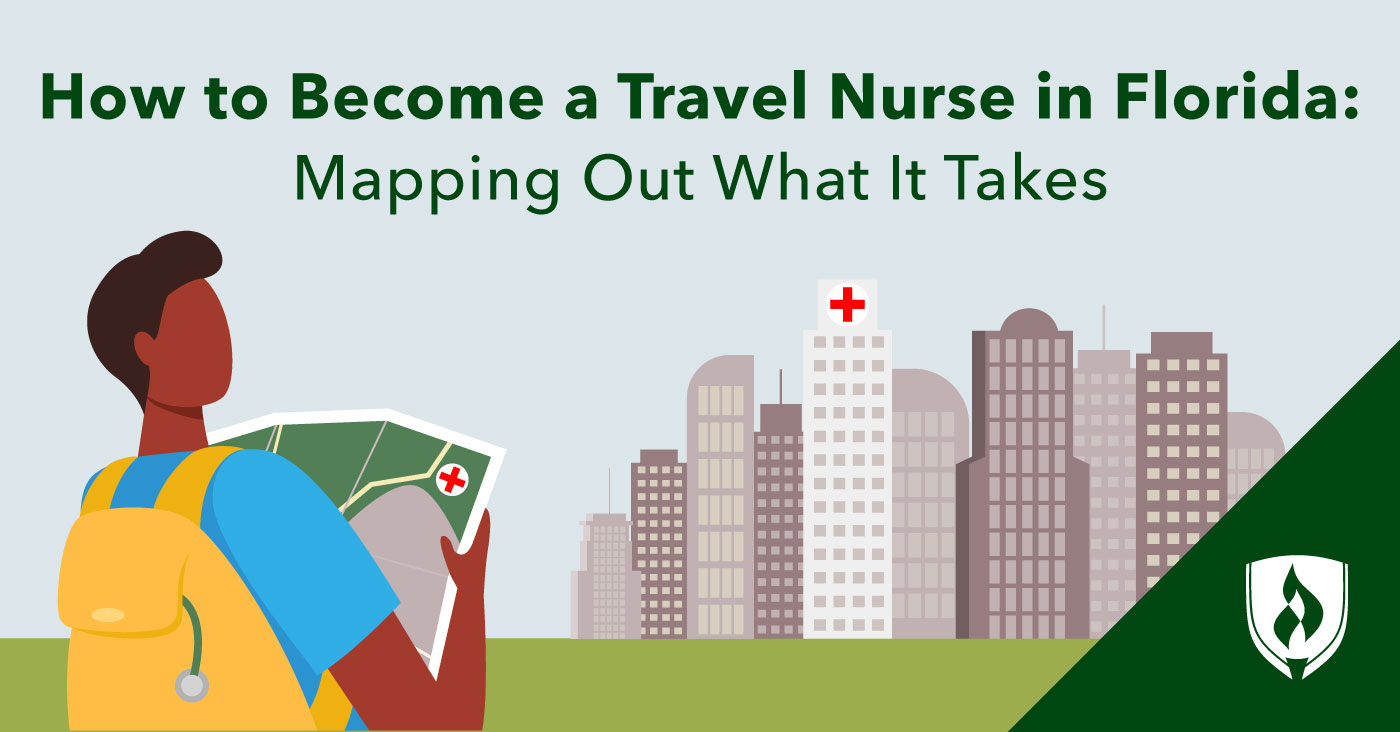Travel nursing is unlike any other profession. The chance to earn a living through contract assignments that move you to new locations—as you fill gaps in healthcare that can save literal lives—well there's nothing else quite like it! If you've felt drawn to the hands-on nursing industry, but also crave the freedom to move around or adjust your schedule from year to year, travel nursing might be the career you're looking for.

Travel nursing is an incredible deal for anyone who doesn't mind moving, according Barbara Ratte, MSN, RN, CNL and full-time nursing instructor at Rasmussen University's Orlando campus. "It pays so well. Many places are short on nurses, and if they can't fill those gaps, hospitals have to close units."
So, what does it take to become a travel nurse? You’re in the right place to find out. Read on to learn more about the steps you’ll need to take to become eligible for travel nursing work and some of the important considerations you’ll want to weigh before getting started.
What is a travel nurse?
A travel nurse is a licensed nurse who works in temporary nursing roles in hospitals and other medical facilities. Through agencies and recruiters, travel nurses are hired for relatively short stints that typically last anywhere from a few weeks to half a year. Healthcare systems utilize travel nurses to fill staffing gaps due to unexpected or planned leaves of absence, parental leave and other forms of staffing fluctuation.
Typically, there is a need for travel nurses in the emergency room, operating room, progressive care, medical-surgical (med-surg) units and intensive care units.1 Even so, travel nurses aren’t confined to these specialties. In Florida, for example, Ratte says there are urban environments with hospital needs, but also plenty of rural areas looking for nurses to work in clinics, long-term care facilities and more.
These nurses are often paid a premium for their work, with many employers providing living stipends and/or higher base pay to attract workers to nonpermanent positions. Travel nurses have the opportunity to seek these positions out as often or as infrequently as they desire, according to Ratte. If you feel like taking some time off after a contract, you can just wait on signing up for your next role.
It's also worth mentioning that you don't have to be a nurse to enjoy this healthcare travel system. Ratte says there are opportunities for most healthcare roles. "You can be a respiratory therapist, a CNA, or an LPN and go wherever there's a need."
What is travel nursing like?
With the chance to earn a higher wage and move somewhere that appeals to you, travel nursing is a heck of a deal for the right person. It's even possible to stay in your state or look for opportunities in one specific spot.
Most travel nurses will pick and choose their contracts through a nursing agency, according to Ratte. "They’ll offer you something, and you can say yes or no. You can say I only want to work in San Diego, or I only want day shifts."
Once you choose a contract, either the employer or your agency will most likely pay for your travel expenses and put you up in a furnished apartment as close to the location as possible. "They want to make it as convenient as they can," Ratte says. "There's so much need for nurses right now, especially since the pandemic. Nurses really have the upper hand in these arrangements."
Ratte also points out that most travel nursing contracts will last from a few months to two years. "The last thing a hospital wants is to train you and get you used to their system, only to need to replace you a week later." Those contracts have legal elements to prevent nurses from bouncing too early from a commitment. "Every contract will have it's own specifics, but they usually have exceptions for emergencies," Ratte says.
How to become a travel nurse in Florida: The steps you’ll need to take
Now that you know a little more about how travel nursing positions work, take a look at the steps that can bring you through a nursing program and into travel nursing! It starts with becoming a registered nurse.
1. Find the right nursing program and gain entrance
The first step for any prospective travel nurse is to find the right nursing program for the role. Nursing has a variety of credential levels, including licensed practical nurse (LPN), registered nurse (RN) and advanced practice registered nurse (APRN). If you are interested in becoming a travel nurse, your best bet for starting out is to pursue an associate’s or bachelor’s degree and become a registered nurse.
Make sure to research programs and consider the entrance requirements and exams, class schedule, program length and cost. Depending on the school and program, you may need to meet certain criteria or complete general education courses prior to starting your nursing education.
2. Pass your nursing classes and graduate
It's time to put in the work and take on your nursing courses with confidence. During this time, you will learn how to work on a healthcare team, how the human body systems work and other essential skills for patient care. This includes learning in classrooms and simulation labs as well through direct, hands-on experience during clinicals.
Nursing school is challenging, but when you graduate, you’ll have a new level of confidence in your skills. It's also worth asking your professors and colleagues in nursing school about travel nursing—forging a connection that can expand your nursing network is always useful!
3. Prepare for—and pass—the NCLEX-RN®
Becoming an RN means passing the National Council Licensure Examination (NCLEX)®, a standardized proficiency test for nurses.
This is a rigorous exam that requires significant preparation time and is the key to working as a nurse—so don’t take preparation lightly.
4. Get your Florida nursing license and a multistate upgrade
After graduation, travel nurse hopefuls in Florida need to earn state licensure. Registered nurses can become licensed in Florida through three different paths.
In general terms this path means you’ve graduated from a Florida-approved or accredited nursing program. There are variations on this requirement for international nurses, military nurses and a few other special cases.
This path is for nurses who’ve obtained a nursing license or worked as a practicing nurse in another state or territory of the U.S. There are specific requirements related to how recent your nursing credentials are and where you obtained them.
This is an important one for travel nurses! According to the Nurse Licensure Compact (NLC), a multistate license means the same thing as a compact license. Both allow a nurse to hold one license (from a particular state) that clears them to practice nursing in all NLC compact jurisdictions.
As of this article, NCSBN’s regulation site lists 39 states that participate in the compact. Florida is one of them!
All of these paths typically require a background check, immunization records and proof of successful completion of the NCLEX-RN®.
Background checks are also part of the process to become a travel nurse. Ratte says a criminal record doesn't necessarily exclude you from licensure or travel nurse agencies, but that the specifics of your record will matter to both nursing boards and employers.
5. Build nursing experience
Barring extreme circumstances, new graduate nurses should not expect to jump directly into a travel nursing position. Most travel nurses have two or more years of nursing practice prior, but it will depend on your experience and the agency you go through.2
Travel nurses jump into the needs and dynamics of each new unit they arrive in. That adaptability requires both skill and experience. While travel nurse assignments may allow you some choice in the kind of nursing role you'll have, you still need lots of knowledge to thrive in this position.
6. Find a travel nursing agency
"A hospital hiring travel nurses is not going to put an ad in a nursing magazine," Ratte says. "Mainly, they'll work with an agency, and tell them how many nurses they need and with what qualifications." Ratte explains that it's much easier for a healthcare institution to connect with one agency than try to vet, interview and hire individual travel nurses. There's no rule against them doing so, but most opportunities for travel nurses will happen through an agency.
This benefits travel nurses and employers since agencies will handle the vetting process, making sure the nurses they send are qualified for the situation. Agencies help with the licensing, paperwork, the working contracts, and they'll even take care of some of those costs.
Travel nurses can work with multiple agencies as well, to have even more options to choose from or compare compensation options, according to Ratte. There's no obligation to accept opportunities they offer you. You can pick and choose contracts based on where you want to go, the type of nursing you want to do (if you're qualified) and even the shift schedules you want.
Travel nursing agencies have locations all over the states, and you can find Florida locations near your city with a quick Google search. Since this role is all about travel, however, don’t limit yourself to local places. Feel free to scour national travel nurse organizations for opportunities or to ask nursing instructors if they have recommendations.
Just make sure you do your research on any organization or travel nursing job you engage with. Job opportunity scams are an issue in many industries. Do some research on any agency you want to join, and don’t provide financial information until you are confident that they're legitimate.
7. Start travel nursing!
Once you have an agency lined up, they will typically provide you with a pool of opportunities for you to choose from. You just have to log into the portal, see the job listings and fill out any additional forms. Agencies will help walk you through legal issues such as drug screens, background checks, license requirements and contracts, according to Ratte.
Once you find an opportunity you like and accept the contract, you can start the relocation process and begin your new position!
How does state nursing licensure work for travel nurses?
State legislatures have the power to define the scope of nursing practice in their state, and each state or territory has its own nursing boards that set state licensure standards.
Because each state defines its scope of nursing differently, it’s possible that a travel nurse will have to hold multiple licenses or get a temporary license for a period of work. However, this is not true of all states. If you work in one of the 39 states gathered under the “compact” (a mutual license recognition deal), many state licenses can be enough.3
If not, most non-compact licensure states offer a relatively streamlined path for nurses in good standing to work as travel nurses. "Remember, they want to make it easy," Ratte says. "They need nurses."
Is travel nursing right for me? Important considerations
Travel nursing can be a rewarding job, but it’s not the right fit for everyone. Here are some other things to consider when deciding whether travel nursing is right for you:
Do you easily get homesick?
If your answer is a resounding “yes!”, you may want to reconsider whether travel nursing, in the long or short term, is right for you. Travel nurses need to adapt to unfamiliar environments and make themselves at home in new locations and new work settings. While there are many ways to stay in touch with loved ones long distance, you'll want to make sure you are okay with the physical space you might suddenly put between yourself and the people close to you.
Travel nurses obviously change locations frequently, so your willingness to forge connections, participate in the community and engage with your coworkers might make (or break) your experience. If you are more of the adventurous type, don’t mind changing things up and want more exposure to various realms of nursing, becoming a travel nurse might fit the bill.
Are you okay with less desirable hours?
Because travel nurses are temporary positions made to fill in staffing gaps, it’s likely that you’ll be working hours that are less desirable.3 For example, you may work nights or weekends. If this one is a deal-breaker for you, you can be more particular about the contracts you accept. But that might narrow your options a bit more.
Something else to note is that most travel nurses do not get paid time off (PTO) because of the flexibility inherent in the job. Remember, travel nurses get to choose when they want to sign a contract for work, so they can take breaks between jobs if they please. For some, this freedom can outweigh the cost of having no PTO while on assignment.
Are you organized?
Chances are if you’ve made it this far, you have a solid foundation for organizational skills. Feeling confident in organization will help you stay on top of changing hours and managing licensures, taxes, housing and other contracts.3 This seems like a small variable, but travel nurses manage an unusual schedule in a given calendar year—keeping things in order will make your life easier.
Can you make this work with your relationships?
Travel nurses might move locations as often as every three or four months. Or they might work in each new setting for two years. There's definitely room to look for the kind of working contract you want. But your decisions will affect your relationships. If you have loved ones who need to stay in a certain location or if you have school-aged children, it's worth considering the details around how often you will travel and how you can make it work.
Are you seeking more variety in nursing?
On top of seeing the country, discovering the ins and outs of nursing across state lines and having the option to contract with a variety of nursing specialties, travel nurses are also likely to be exposed to other units via being a “float” nurse.3 For example, if you sign a contract with the ICU at a hospital but the pediatrics unit is understaffed, as a travel nurse, you will likely be the first pick to be sent to pediatrics in comparison to other ICU nurses who are permanently working in that hospital.
Where could a nursing degree take you next?
As you can see, travel nurses enjoy plenty of quirks in their profession. But for the right person, this role is a total dream. The excitement of travel, flexible work schedule and incentives that healthcare systems might offer to attract travel nurses can make this role both rewarding and thrilling.
Now that you know more about what it takes to become a travel nurse in Florida, travel nursing roles and the steps you’ll need to take in order to make it happen, are you ready to get started? You can learn more about what it’s like to attend nursing school with our article “How Hard Is Nursing School? Students Tell All.”
1 “What is a Travel Nurse?,” TravelNursing.com, AMN Healthcare, [accessed March 2023], https://www.travelnursing.com/what-is-travel-nursing/what-is-a-travel-nurse/.
2 Kathleen Gaines, “Career Guide Series: Travel Nurse,” Nurse.org, March 28, 2022, [accessed March 2023], https://nurse.org/resources/travel-nurse-career-guide/.
3 “Nurse Licensure Compact (NLC),” National Council of State Boards of Nursing, February 1, 2022, [accessed March 2023], https://www.ncsbn.org/nurse-licensure-compact.htm.
NCLEX and NCLEX-RN are registered trademarks of the National Council of State Boards of Nursing, Inc.
EDITOR’S NOTE: This article was originally published in October 2022. It has since been updated to include information relevant to 2023.


.png)

